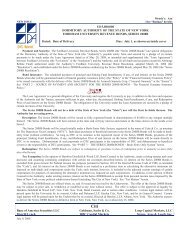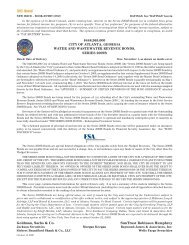Cleveland Clinic Health System Obligated Group - FMSbonds.com
Cleveland Clinic Health System Obligated Group - FMSbonds.com
Cleveland Clinic Health System Obligated Group - FMSbonds.com
You also want an ePaper? Increase the reach of your titles
YUMPU automatically turns print PDFs into web optimized ePapers that Google loves.
provide “appropriate medical screening” to patients who <strong>com</strong>e to the emergency department. If an emergencymedical condition exists, the hospital must stabilize the patient or effect an appropriate transfer of the patient. OnSeptember 9, 2003, CMS issued rules clarifying hospital obligations under EMTALA. The rules expanded thedefinition of hospital emergency department to include any department or facility of the hospital, regardless ofwhether it is located on or off the main hospital campus, that (i) is licensed by the state in which it is located underapplicable state law as an emergency room or emergency department; (ii) is held out to the public as a place thatprovides care on an emergency medical or urgent care basis or (iii) provides at least one third of all of its outpatientvisits for the examination and treatment of emergency medical conditions. The rules also clarify the physician “oncall”requirements to allow hospitals the discretion to develop their on-call lists in a way that best meets the needs oftheir <strong>com</strong>munities. Furthermore, the rules permit hospital departments that are off-campus to provide the mosteffective way for caring for emergency patients without requiring that the patient be moved to the main campus. Inaddition, the rules provide that emergency room services provided to screen and stabilize a Medicare beneficiaryfurnished after January 1, 2004, must be evaluated for Medicare’s “reasonable and necessary” requirements on thebasis of information available to the treating physician or practitioner at the time the services were ordered. OnAugust 1, 2006, CMS released a rule finalizing two further revisions to the EMTALA regulations, one relating tolabor and delivery related discharges and the other requiring that all Medicare-participating hospitals withspecialized capabilities, including specialty hospitals, must accept appropriate transfers of unstable individuals,regardless of whether the hospital with specialized capabilities has an emergency department.In the IPPS 2009 Final Rule, CMS made further amendments to EMTALA. Under the IPPS Final Rule, ifan individual with an unstable emergency medical condition presents to a participating hospital and is admitted, theadmitting hospital has satisfied its EMTALA obligation. If the patient is subsequently transferred to a hospital withcapabilities for specialized care, that hospital does not have an EMTALA obligation to accept the individual. CMSinvites ongoing public <strong>com</strong>ment on whether this policy results in unintended consequences, such as refusals byhospitals with specialized capabilities to accept the transfer of inpatients whose emergency medical conditionremains unstabilized. The IPPS Final Rule also finalizes requirements that hospitals must meet to participate in a<strong>com</strong>munity call plan to share on-call responsibilities and <strong>com</strong>ply with EMTALA.Failure to <strong>com</strong>ply with the EMTALA may result in a hospital’s exclusion from the Medicare and/orMedicaid programs, as well as civil monetary penalties. As such, failure of the <strong>Obligated</strong> Issuers to meet theirresponsibilities under the EMTALA could adversely affect the financial condition of the <strong>Obligated</strong> Issuers.Management of the <strong>Cleveland</strong> <strong>Clinic</strong> believes its policies and procedures are in material <strong>com</strong>pliance withEMTALA, but no assurance can be given that a violation of EMTALA will not be found. Any sanctions imposed asa result of an EMTALA violation could have a material adverse effect on the future operations or financial conditionof the <strong>Obligated</strong> Issuers.Enforcement ActivityEnforcement activity against health care providers has increased, and enforcement authorities mayaggressively pursue perceived violations of health care laws. In the current regulatory climate, it is anticipated thatmany hospitals and physician groups may be subject to an audit, investigation, or other enforcement actionregarding the health care fraud laws mentioned above. The cost of defending such an action, the time andmanagement attention consumed, and the facts of a case may dictate settlement. Therefore, regardless of the meritsof a particular case, a hospital could experience materially adverse settlement costs, as well as materially adversecosts associated with implementation of any settlement agreement. Prolonged and publicized investigations couldalso be damaging to the reputation and business of a hospital, regardless of out<strong>com</strong>e.Certain acts or transactions may result in violation or alleged violation of a number of the federal healthcare fraud laws described above, and therefore penalties or settlement amounts often are <strong>com</strong>pounded. Generallythese risks are not covered by insurance.Joint VenturesThe OIG has expressed its concern in various advisory bulletins that many types of joint venturearrangements involving hospitals may implicate the Anti-Kickback Statute, since the parties to joint ventures are36




